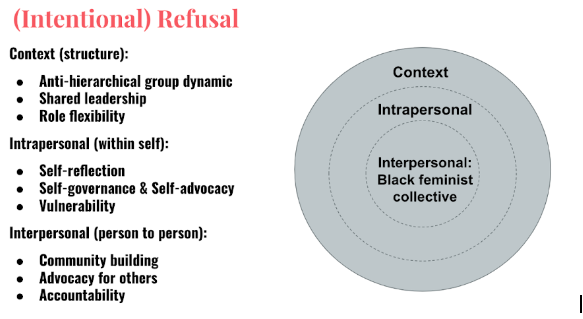Political & Ethical Commitments
Humanizing Research
Django Paris describes humanizing research as a methodological stance that allows for…building of relationships with care and dignity. We believe that humanizing research arises from an ethical need to push against social inequities and anti-Blackness. Conducting research that is humanizing is especially important when researchers are engaging with historically marginalized communities.

Intentional refusal is a dynamic framework for thinking about our relationships from structural, intrapersonal, and interpersonal perspectives that moves us away from white, Western ideologies and mitigates self and interpersonal harm. We engage in intentional refusal to call for humanizing, caring research approaches that center on unlearning. Intentional refusal consists of three levels of consideration. First, opportunities are contextual, occurring within the structure of our lab. We use an anti-hierarchical group structure where leadership is shared, and roles are flexible where we all can simultaneously be experts and novices. Next, is intrapersonal, occurring within the self. Our lab members exercise their rights to self-sovereignty- being vulnerable in expressing their needs, wants, and desires as Black women researchers in the space, and several opportunities for self-care and reflection during the research process. Finally, interpersonal considerations push us to prioritize community-building activities, advocacy for others, and exercises of accountability to our emergent political and ethical commitments.
Political Commitments
Some of the political commitments we’ve discussed as a group are protection, joy, and wellness.

